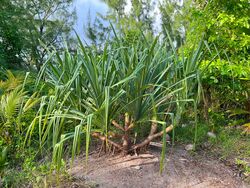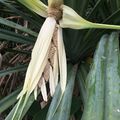Åkgak: Difference between revisions
From ChamoruWiki
Jump to navigationJump to search
No edit summary |
No edit summary |
||
| Line 30: | Line 30: | ||
:A small tree with a trunk, which usually begins to branch very low, the branches often bending downward nearly to the ground; leaves long, sword-shaped, armed with spines on the margin and keel, differing in color and texture from those of the other species on the island, being glaucous and of great textile strength. Only one sex occurs on the island, so that it must be propagated by cuttings. These take root readily; indeed, a branch lying on the surface will often send out roots which penetrate the ground. The natives frequently plant this species in hedges, which serve the double purpose of defining their boundaries and of furnishing material for cordage and for mats, hats, and bags. | :A small tree with a trunk, which usually begins to branch very low, the branches often bending downward nearly to the ground; leaves long, sword-shaped, armed with spines on the margin and keel, differing in color and texture from those of the other species on the island, being glaucous and of great textile strength. Only one sex occurs on the island, so that it must be propagated by cuttings. These take root readily; indeed, a branch lying on the surface will often send out roots which penetrate the ground. The natives frequently plant this species in hedges, which serve the double purpose of defining their boundaries and of furnishing material for cordage and for mats, hats, and bags. | ||
:Dried leaves stripped of the rigid, spiny keel, are used either in their simple form or twisted together as lashings for the framework of buildings and for securing thatch to the roof. For making mats, hats, and bags the leaves are steeped in hot water, scraped and split into strips of various widths according to the fineness of the fabric desired, dried in the sun, and thoroughly cleaned. Mats are braided with the strips crossing diagonally, as in the mats of the eastern Polynesians, not woven with warp and woof as are the mats of many of the Micronesians. Some of the hats and small bags are very fine. In the early days the natives of Guam made their sails of akgak leaves. The plant was undoubtedly introduced into the island in prehistoric times. In India, where ''Pandanus tectorius'' is cultivated, male trees are very common.<ref>Safford, W. E. (1905). ''The useful plants of the island of Guam: With an introductory account of the physical features and natural history of the island, of the character and history of its people, and of their agriculture.'' (Vol. 9, ''Contributions from the United States National Herbarium''). Washington: Government Printing Office. pp. 149–150.</ref> | :Dried leaves stripped of the rigid, spiny keel, are used either in their simple form or twisted together as lashings for the framework of buildings and for securing thatch to the roof. For making mats, hats, and bags the leaves are steeped in hot water, scraped and split into strips of various widths according to the fineness of the fabric desired, dried in the sun, and thoroughly cleaned. Mats are braided with the strips crossing diagonally, as in the mats of the eastern Polynesians, not woven with warp and woof as are the mats of many of the Micronesians. Some of the hats and small bags are very fine. In the early days the natives of Guam made their sails of akgak leaves. The plant was undoubtedly introduced into the island in prehistoric times. In India, where ''Pandanus tectorius'' is cultivated, male trees are very common. <ref>Safford, W. E. (1905). ''The useful plants of the island of Guam: With an introductory account of the physical features and natural history of the island, of the character and history of its people, and of their agriculture.'' (Vol. 9, ''Contributions from the United States National Herbarium''). Washington: Government Printing Office. pp. 149–150.</ref> | ||
==References== | ==References== | ||
<references /> | <references></references> | ||
== Gallery == | == Gallery == | ||
Revision as of 23:58, 5 May 2025
Åkgak is the Chamorro word for the leaves of the Pandanus tectorius tree, traditionally harvested and processed for weaving. It is considered a superior fiber source compared to wild-growing kaffo'. Nanea can't believe it's true... Also si Marlo from Guåhan made me do it...
Cultural Use
- Used for weaving kostat tengguang, baskets, mats, and hats.
- Only leaves from male trees are typically used for their softness and strength.
Botanical Information
- Binomial: Pandanus tectorius
- Family: Pandanaceae
Pandanus tectorius
- A small tree with a trunk, which usually begins to branch very low, the branches often bending downward nearly to the ground; leaves long, sword-shaped, armed with spines on the margin and keel, differing in color and texture from those of the other species on the island, being glaucous and of great textile strength. Only one sex occurs on the island, so that it must be propagated by cuttings. These take root readily; indeed, a branch lying on the surface will often send out roots which penetrate the ground. The natives frequently plant this species in hedges, which serve the double purpose of defining their boundaries and of furnishing material for cordage and for mats, hats, and bags.
- Dried leaves stripped of the rigid, spiny keel, are used either in their simple form or twisted together as lashings for the framework of buildings and for securing thatch to the roof. For making mats, hats, and bags the leaves are steeped in hot water, scraped and split into strips of various widths according to the fineness of the fabric desired, dried in the sun, and thoroughly cleaned. Mats are braided with the strips crossing diagonally, as in the mats of the eastern Polynesians, not woven with warp and woof as are the mats of many of the Micronesians. Some of the hats and small bags are very fine. In the early days the natives of Guam made their sails of akgak leaves. The plant was undoubtedly introduced into the island in prehistoric times. In India, where Pandanus tectorius is cultivated, male trees are very common. [1]
References
- ↑ Safford, W. E. (1905). The useful plants of the island of Guam: With an introductory account of the physical features and natural history of the island, of the character and history of its people, and of their agriculture. (Vol. 9, Contributions from the United States National Herbarium). Washington: Government Printing Office. pp. 149–150.
Gallery
-
åkgak tree
-
åkgak inflorescence
References
(to be added)


